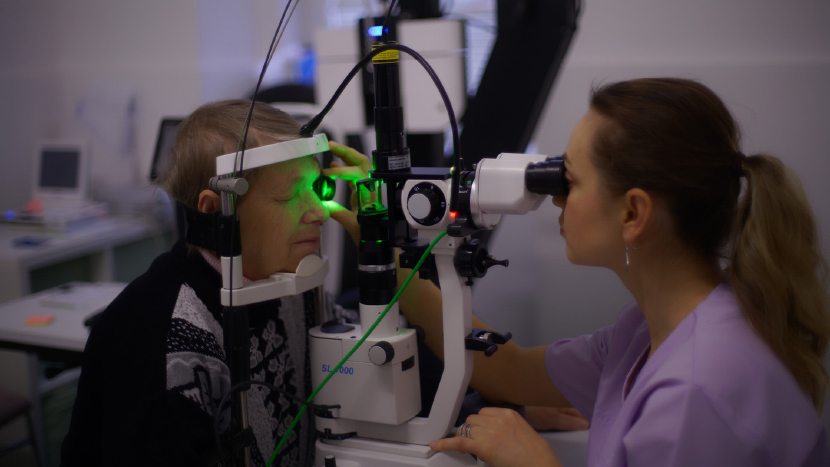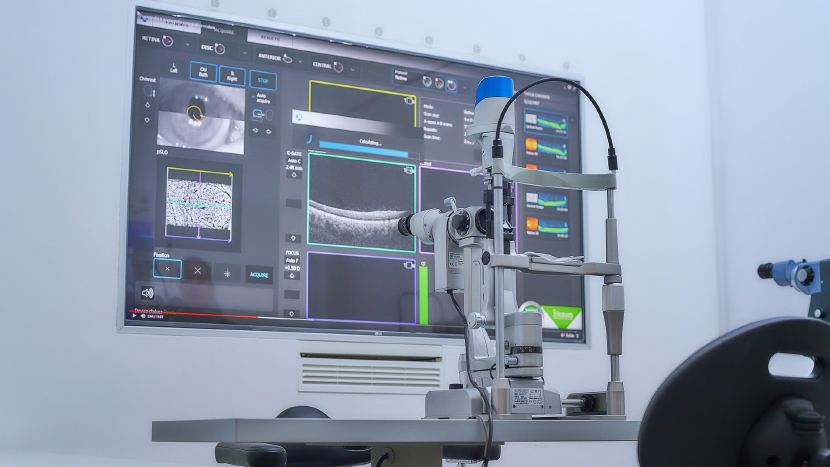Case Studies
Showcasing LOC Innovation and Expertise

LOCSU aims to highlight the work of LOCs by promoting their innovative initiatives and sharing best practices. This year LOCSU has published a regular cadence of case studies designed to celebrate success and inspire LOCs with ideas for their own area. They also demonstrate to wider audiences how the resources and expertise available in primary eyecare can solve many public healthcare challenges.
The case studies focus on the drivers for change, the areas where primary care optometry is under-utilised, and the measurable impact in the areas where services have been implemented. They also detail the continuous improvement activities undertaken by LOCs to refine commissioned services.
The case studies published this year cover CUES/MECS, Cataracts, Glaucoma, and Stroke Risk Identification.
MECS/CUES: The Introduction of Electronic Triage and Ophthalmology Referral Feedback Enhance Services in Devon and Manchester
A core objective of MECS and CUES is to reduce pressure on urgent care departments by managing a greater proportion of patients in primary eyecare. Once implemented, it is always valuable to seek ways to refine and enhance these services and this is exactly what Devon and Manchester LOCs succeeded in doing. Their achievements are documented in case studies published during the year.
In Plymouth, Devon, a review of the introduction of an electronic triage system to an already successful MECS found that approximately 20% of people presenting to MECS were subsequently care-navigated to another service or managed with simple self-care advice.
“We have proven the efficacy of the service, which will make future commissioning decisions robust, and we will take the learnings from our data to develop the next generation of community provision.”
Max Halford, Chair of Devon LOC and Primary Eyecare Devon MECS CGPL
The case study documents the process and findings that indicate electronic triage is a valuable complement to MECS.
Manchester CCG was one of the first areas to commission the COVID Urgent Eyecare Service (CUES), which was launched in May 2020. Manchester LOC, alongside Manchester Royal Eye Hospital (MREH) and Primary Eyecare Services, worked together to identify that locally implemented referrals feedback could further reduce secondary care presentations through co-management of the patient by redirecting the referral back into primary care for assessment and management within CUES.
This was achieved through integrating the IT system used in Manchester for the provision of CUES with the NHS e-Referral Service (e-RS), allowing it to be used in primary eyecare, with secondary care providers able to access clinical referral information. The case study details the benefits this approach has delivered, from improving optometrist skills and confidence to increased management of patients within primary care
Cataracts: Demonstrating Primary Care Cataract Options
An ageing population and delays caused by COVID-19 means demand for cataract care is set to rise by an estimated 20% in the next ten years. Traditional care models are hospital-based and heavily reliant on consultant teams. Post-operative care places unmanageable pressure on hospital out-patient services.
LOCSU has worked with LOCs and Primary Eyecare Services (PES) to publish three case studies that clearly demonstrate the core skills possessed by optometrists and the significant potential of primary eyecare to effectively deliver pre- and post-operative cataract care.
‘The Role of the Optometrist in Cataract Care’ uses the example of Manchester Cataract Service to highlight the role of optometrists across the entire cataract care pathway.
The case study underlines the value of collaboration across primary and secondary care. It shows how the use of optometrists across the entire pathway leads to:
- Excellent care delivered closer to home for the patient
- More appropriate use of hospital appointments
- Shorter waiting lists for those needing more complex care
- Correct use of resources
To emphasise the proven benefits of primary care-delivered post-operative cataract services, LOCSU worked with Wakefield LOC and the Mid-Yorkshire Trust to publish a case study on their implementation of the service in the region. It explores how a close relationship between optometrists and ophthalmologists led to the development of an effective model that released nurse practitioners, optometrists and consultants to use their time for other procedures.
LOCSU also published a case study exploring how LOC Company Primary Eyecare Services worked with an independent sector provider of NHS Cataract Surgery (Optegra) to establish a national contract to provide post-cataract assessment in a primary care-led service encompassing 1,800 optometry practices and undertaking 15,000 post-operative appointments in primary care with potential to increase hospital capacity by 3,000 new patient appointments per annum.
Glaucoma: Reviewing and Enhancing Glaucoma Provision To Prepare for Future Demand
Glaucoma services currently account for over 20% of outpatient activity in hospital eye services, with demand predicted to grow by 44% by 2035. To support recognition of the value of commissioning Enhanced Case Finding (ECF) alongside repeat measures, LOCSU published a case study exploring how it utilises primary care expertise to:
- Reduce avoidable referrals
- Release capacity in hospital glaucoma services
- Help prevent irreversible sight loss
The case study highlights how studies show ECF is cost-effective and reduces false negative referrals. It emphasises that new models for glaucoma are needed and explains how primary care optometry can support recovery and transformation of current services.
Supporting the principle of glaucoma service provision in primary care, LOCSU also published a case study exploring how ‘Independent Evaluation Leads to Improved Glaucoma Monitoring Service in Devon.’
“We have moved to pro-active management within the service rather than being reactive when problems occur.”
Deborah Bill, Clinical Governance and Performance Lead, Primary Eyecare Devon
The study shows how the recommendations made during an independent audit of a glaucoma service were translated into actions that improved patient record collection accuracy from 88% to 100% and raised levels of governance and compliance.
Stroke Risk Identification: Leveraging Primary Eyecare To Deliver Adjacent Healthcare Services
The accessibility of primary eye care settings and the skills of our clinical teams offers considerable opportunities to provide a broader range of services within optical practices. Cheshire LOC, in conjunction with Cheshire East ICP and with the support of five local practices, has taken part in a 12-month NHS England-funded trial to reduce stroke rates across East Cheshire.
The trial saw five practices equipped with a Kardia Mobile Heart monitor and compatible mobile app which detects the ECG and assesses the risk of atrial fibrillation (AF) – which is an indicator of increased stroke risk – in patients aged 60+.
During the trial:
- 31 patients referred for further investigation on the discovery of suspected AF
- 12 patients who were already that they had AF had it confirmed
- Scope to offer AF testing to companions and carers of patients was identified
This case study underlines how providing services such as AF screening in primary eye care settings aligns with the NHS long term plan to deliver care closer to home and to make every contact count.
The range of case studies published this year emphasises the incredible scope and potential of primary eyecare to deliver exemplary care, close to the patient, that relieves pressure on hospitals and releases resources for other services.
“It is vital that we continue to document the innovation and expertise intrinsic in LOCs and the sector as a whole. Our focus on collating and publishing case studies means that we have a robust bank of evidence to support engagement with ICSs as we campaign for wider commissioning of our care pathways.”
Zoe Richmond, LOCSU Clinical Director



